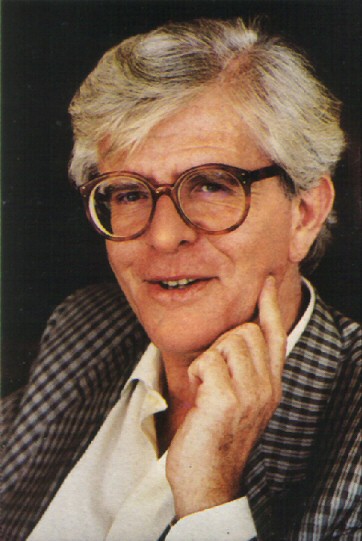Henry Chapier (found films by French director; late 1960s-early 1970s)
Henry Chapier, a reputable French journalist.
Status: Found
Date found: 2009
Henry Chapier is a noteworthy French journalist, film critic, and television personality. During the late 1960s and early 1970s, he briefly worked as a filmmaker on a total of four films. Two of these, Un été américain and Salut, Jerusalem, are documentaries, while the other two, Sex Power and Amore, are abstract, allegorical works. Three of these films (Sex Power, Salut, Jerusalem, and Amore) are notable in part for their soundtracks, which were early efforts by noted composer Vangelis, best known for his scores for Chariots of Fire and Blade Runner.
None of his films were given a wide release and soon faded into obscurity. In 2009, the French National Audiovisual Institute, or INA, located copies of the films and began to remaster them for general release. Now, Chapier's entire filmography is publicly available on DVD: Un été américain and Sex Power were released in 2010, and Salut, Jerusalem and Amore being released in 2012.
Film Summaries
Chapier's first film, Un été américain (French for "An American Summer") in 1969, was a documentary about a group of young Californian militants affiliated with the Black Panthers. In his film, Chapier focuses on solidarity for the militants, questioning their methods rather than their motives. The documentary features footage of the protests that accompanied the trial of Black Panther Party co-founder Huey P. Newton as well as footage of the militants' lifestyle intercut with interviews with the group's members.
Chapier's second renowned film was Sex Power, released in 1970. The film is an abstract, allegorical drama about the peace movement of the late 1960s and why it was doomed to fail. It was Chapier's first collaboration with Vangelis and was such the director's only film to include an official soundtrack album. When shown at the 1970 San Sebastian Film Festival (at which Fritz Lang was reportedly one of the judges) the film won the Silver Shell prize.
Chapier's Salut, Jerusalem (French for "Hail Jerusalem") from 1972 is a documentary about Tel Aviv. Chapier makes the location serve as the main character, as the interview subjects serve a symbolic purpose for the film. Due to its short length (approx. 30 minutes), it is unknown if Salut, Jerusalem was ever shown theatrically, or whether it was only broadcast on television.
Chapier's final film, Amore, is released in 1973 and stars Daniel Quenaud and Sonia Petrovna. Amore is another abstract, allegorical drama about the decline of the city of Venice and the various attempts throughout history to "rescue" it. Perhaps the film's most striking feature, aside from Vangelis' soundtrack, is its opening and ending credits sequences, which are presented over a series of surrealist paintings of Venice.
External Links
- Wikipedia article. Retrieved 19 Mar '16
- IMDb page. Retrieved 19 Mar '16

